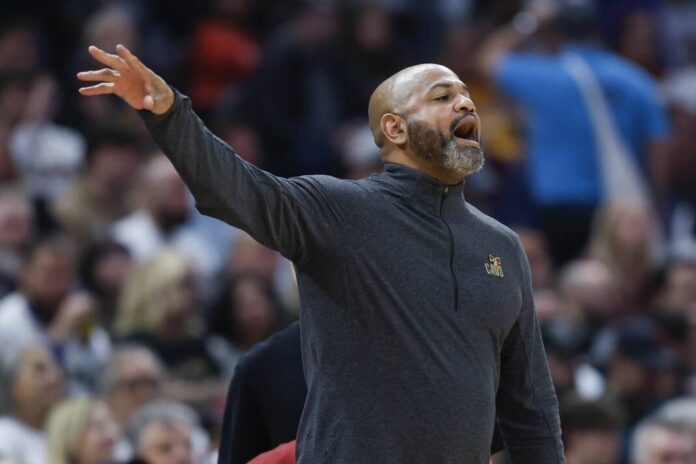CLEVELAND – The most accomplished free-agent coach barely owns more trophies than pink slips.
Mike Budenholzer won Coach of the Year for both the Hawks and Bucks. He set the franchise record for wins in Atlanta (no trophy, but notable) and won a championship in Milwaukee. And both teams fired him, anyway.
The Bucks did so after Budenholzer transformed their 44-win franchise into a perennial contender. Milwaukee led the league in regular-season wins (271) during Budenholzer’s five-year tenure and ranked second in playoff wins during the same window (39, though the Heat could pass them with three wins in this week’s NBA Finals).
But four weeks ago, less than two years removed from the team’s first championship in 50 years, Milwaukee GM Jon Horst decided his Bucks could do better than Bud, whom Horst considered a friend, after a first-round playoff exit.
“Ultimately, we just haven’t ended these seasons and these runs and these opportunities to contend in the way that we want or expect,” Horst said during a May 4 press conference explaining the decision. “And those expectations have changed over the course of time.”
The rubric shifts quickly during the playoffs, and Horst’s perspective may soon ring poignant in Cleveland. As of April 28, Cavs president of basketball operations Koby Altman said 51 wins and a first-round playoff series counted as a successful season, and he voiced enthusiastic support for coach J.B. Bickerstaff, who finished third in NBA Coach of the Year voting. Altman’s Cavs, like NBA finalists Denver and Miami, placed a bet on continuity.
That’s a hedge against normalcy in 2023. Out of 30 NBA coaches, only four – San Antonio’s Gregg Popovich, Miami’s Erik Spoelstra, Golden State’s Steve Kerr and Denver’s Mike Malone – have coached five years or longer with their current teams. And since the regular season ended, four coaches (including Budenholzer) have been canned amid tenures many would deem successful.
Turns out, management disagreed.
Philadelphia fired Doc Rivers after the veteran coach banked more regular-season wins than any 76ers team since 2001. Toronto fired Nick Nurse (who then took the 76ers job) four seasons after Nurse led the Raptors to their first NBA title. And Phoenix fired Monty Williams two seasons after his Suns lost in the NBA Finals against, ironically, Budenholzer’s Bucks.
All four firees had better resumes than Bickerstaff, whose coach of the year votes faded from Cleveland fans’ memories with every Mitchell Robinson putback during the postseason. That doesn’t mean Bickerstaff deserved a similar fate, but it does suggest that “deserve” carries relative meaning in the coaching world. So does “success,” the word Altman used to describe Bickerstaff’s third season as head coach (two away from the magic number). Fifty-one wins fit the bill this season, but expectations change, and they usually don’t shrink.
Just ask Rivers, who averaged 51 wins and won a playoff series every season during his three-year tenure. Or Nurse, who posted a .582 winning percentage and won 25 playoff games over five years in Toronto. Or Budenholzer and Williams, who are looking for work after meeting in the Finals 23 months ago.
Patience may be the story of these Finals, but the league at large is running out of it. Even the lucky few with job security know how fragile such commitments can be.
“My first response is not necessarily shock,” Kerr said during when asked about Budenholzer’s firing during the playoffs, “it’s more disappointment because Bud is a fantastic coach.”
“But this is the business we’re in … it just happens quickly. I mean, expectations every year for every team are so high, and only one team can win. It’s sad news for the coaching profession.”







